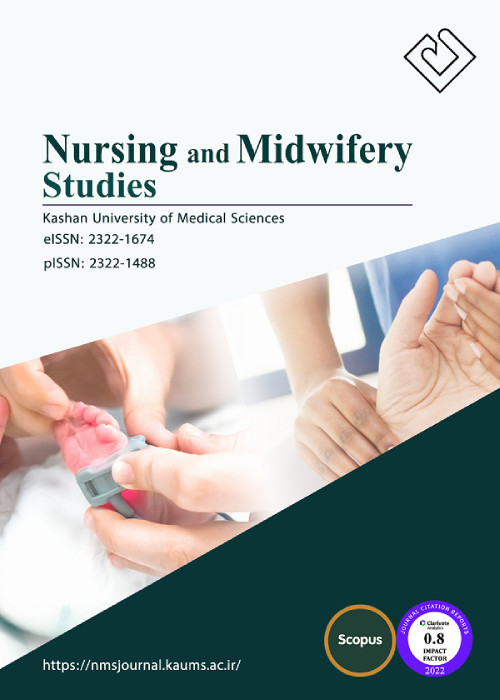Nursing Student's Competencies in Evidence-Based Practice and Its Related Factors
Author(s):
Abstract:
Background
Evidence-Based Practice (EBP) is one of the nursing professional roles that can lead them to provide the best and more effective care. However, no studies are available on nursing students’ competencies in EBP.Objectives
This study aimed to investigate the nursing students’ knowledge, attitude and intention to implement EBP and its related factors in two nursing and midwifery faculties in Tehran, Iran.Materials And Methods
In this cross-sectional study, 170 undergraduate nursing students were selected from two faculties of nursing and midwifery in Tehran, Iran. A census sampling method was applied and they were all before graduation in 2013. The Rubin and Parrish questionnaire was used to assess the students’ knowledge, attitude and intention to implement EBP as well as factors affecting the implementation of EBP. Students completed the instrument through self-report. Descriptive statistics, Independent sample t-test and Pearson correlation coefficient were used to analyze the data.Results
The students mean scores of knowledge, attitude and intention to implement EBP was 31.08 ± 5.77, 50.40 ± 9.58, 36.01 ± 4.64, respectively. The students’ age was inversely correlated with their scores of knowledge, attitude and intention to use EBP (P < 0.05). However, the students’ GPA was in direct association with their knowledge, attitude and intention to implement EBP (P < 0.05). No significant differences were observed between the males and females mean scores in the three subscales. However, significant differences were found between the students mean scores in the two subscales of knowledge and attitudes toward EBP in terms of familiarity with statistics and research methods (P < 0.05). Neither familiarity with research methods nor familiarity with EBP could significantly affect the students’ intention to implement EBP.Conclusions
The present study showed that nursing students have not a high mean score in the three subscales of knowledge, attitude and intention to implement EBP. It is essential for faculties and nurse managers not only to focus on education of EBP, but also to support nurses and nursing students to implement it in the process patient care.Keywords:
Language:
English
Published:
Nursing and Midwifery Studies, Volume:4 Issue: 4, Oct-Dec 2015
Page:
9
magiran.com/p1491683
دانلود و مطالعه متن این مقاله با یکی از روشهای زیر امکان پذیر است:
اشتراک شخصی
با عضویت و پرداخت آنلاین حق اشتراک یکساله به مبلغ 1,390,000ريال میتوانید 70 عنوان مطلب دانلود کنید!
اشتراک سازمانی
به کتابخانه دانشگاه یا محل کار خود پیشنهاد کنید تا اشتراک سازمانی این پایگاه را برای دسترسی نامحدود همه کاربران به متن مطالب تهیه نمایند!
توجه!
- حق عضویت دریافتی صرف حمایت از نشریات عضو و نگهداری، تکمیل و توسعه مگیران میشود.
- پرداخت حق اشتراک و دانلود مقالات اجازه بازنشر آن در سایر رسانههای چاپی و دیجیتال را به کاربر نمیدهد.
In order to view content subscription is required
Personal subscription
Subscribe magiran.com for 70 € euros via PayPal and download 70 articles during a year.
Organization subscription
Please contact us to subscribe your university or library for unlimited access!


